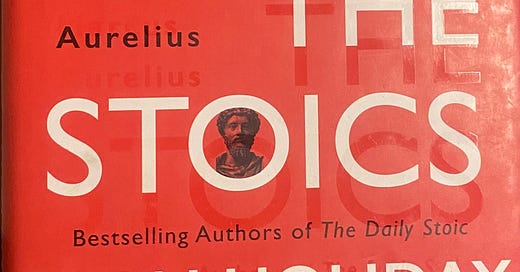THE BOOK REPORT Episode 31- Lives of the Stoics by Ryan Holiday and Stephen Hanselman- Cato the Younger
Cato the Younger: Rome’s Iron Man
“To Cato, it was the actions one took, the sacrifices one was willing to make- especially at arms defending one’s country- that made you a philosopher. And so in that war, as in the battles he fought in, he was fearless and committed, as he believed every citizen was obligated to be.”
Marcus Porcius Cato was born in 95bc to a family that was “firmly entrenched in Rome’s aristocracy.” Cato the Elder, his great-grandfather, was a military tribune and rose up all the way to council in 195bc, he earned his fortune in agriculture. Cato was known as a Stoic for who he was and what he did, not what he wrote. “Nearly every Stoic before and after was in part famous for what they said and wrote. Alone among them, Cato would achieve towering fame not for his words, but for what he did and for who he was.” As a boy, Cato was said to have a determined will and a flared temper. There is a story about a soldier hanging him by the balcony and Cato just looked at the soldier, unmoved. Once Cato asked why Sulla, a general and statesman, would get gifts and money from people, his tutor said that it was because he was feared. Cato then asked his tutor “Why then didn’t you give me a sword, so I can free my country from slavery?” “He demanded an explanation for every task assigned to him, and luckily, his tutor chose to encourage this commitment to logic rather that beat it out of his young charge.”
In 68bc, twenty-seven years old, Cato joined the military and later he would enter into politics as well. In both, he practiced integrity, even though “Corruption may have been endemic in Rome” Cato was the only one “who actually adhered to the canvasing restrictions and laws.” It made him stand out and earned him respect. When it came to politics and public service, “His job, Cato believed, in a tradition begun by Diogenes, was to serve the public good. Not himself. Not expediency. Not his family. But the nation.” I see politicians go into office for all the wrong reasons. Everybody knows the reputation of politicians nowadays and I’m guessing it would be hard to name one honest politician if you had to. But Cato stood firm, even in Rome, even when “everyone else is doing it” we need more of these people in politics today!
He was clever too, he was the first one to use the filibuster, “When Caesar became consul, he would imprison Cato so as not to hear his marathon ramblings and so the business of the state could remain.” His unshakable integrity, even though honorable, did hurt him at times. There is a story told in the book; Pompey offered a marriage alliance to either Cato’s niece or daughter. Cato, rudely said no, which made Caesar and Pompey alliances instead, “United and unstoppable, the two men would soon overturn centuries of constitutional precedent.” Cato’s both niece and daughter were excited about the offer Pompey made, but Cato refused because of his integrity. This hurt him and the state, did Cato do the right thing, or should he have entertained the alliance? When it came to public welfare, he was “stubborn and immovable” “but when it came to personal disagreements, was always calm and friendly. Within him, there was ‘an equal blend… of severity and kindness, of caution and bravery, of solicitude for others and fearlessness for themselves, of the careful avoidance of baseness and, in like degree the eager pursuit of justice.’ Cato was kind. Cato was tough. He was in a way, the embodiment of an expression that a stoic in modern times, General James Mattis, would adopt as a motto of the first Marine Division: No better friend, no worse enemy.” No better friend, no worse enemy… Why is a person an enemy? Because he insulted or hurt you? No. A person is your enemy because he is trying to do harm, he is trying to make things worse, for their own sake. It is not about you; it is about the greater good, Cato thought. Pompey and Cato were fighting against Caesar for Rome, Caesar got the upper hand so Cato decided to commit suicide. I don’t understand his reasoning, but I’m guessing he didn’t want to ask for mercy. “He asked only one last thing of them. (The senators) Do not pray for me, he said, do not ask for my grace. Such pleas belonged to the conquered, and Cato had not lost. Where it mattered, he believed, in all that was honorable and just, he had beaten Caesar.” He had a last meal with his son and some of his friends. When the meal was over, he retired to his chamber and read. He asked for his sword and stabbed himself in the chest. A doctor sewed his wound shut but “In his final moments, Cato came to, and with the fierce and almost inhuman determination he had first exhibited as a young boy, he died at forty-nine years old pulling his own wound open so that life could escape him more quickly.” He died in 46bc.
“Seneca observed that all ages produced men like Clodius and Caesar and Pompey, ‘but not all ages men like Cato.’ Few politicians would have risked their lives for something as abstract as principle, few would have kept going even when the cause spit in their face, few had the combined genius at arms, at leadership, at strategy to have brought his people so close to success.”
I hope you enjoyed another episode of The Book Report: Lives of the Stoics, I hope to be putting out more content and as always tell me what you think. Thank you!


